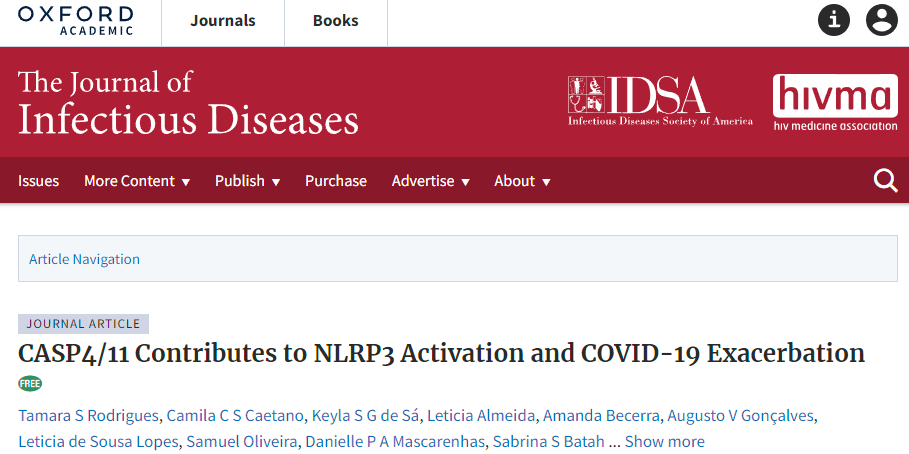CASP4/11 Contributes to NLRP3 Activation and COVID-19 Exacerbation
Severe acute respiratory syndrome coronavirus 2 (SARS-CoV-2) infection triggers activation of the NLRP3 inflammasome, which promotes inflammation and aggravates severe COVID-19. Here, we report that SARS-CoV-2 induces upregulation and activation of human caspase-4/CASP4 (mouse caspase-11/CASP11), and this process contributes to NLRP3 activation. In vivo infections performed in transgenic hACE2 humanized mice, deficient or sufficient for Casp11, indicate that hACE2 Casp11-/- mice were protected from disease development, with the increased pulmonary parenchymal area, reduced clinical score of the disease, and reduced mortality. Assessing human samples from fatal cases of COVID-19, we found that CASP4 was expressed in patient lungs and correlated with the expression of inflammasome components and inflammatory mediators, including CASP1, IL1B, IL18, and IL6. Collectively, our data establish that CASP4/11 promotes NLRP3 activation and disease pathology, revealing a possible target for therapeutic interventions for COVID-19
Publication Year
Publication Journal
Associeted Project
Microbiology or Immunology
Lista de serviços
-
RASL11A, member of a novel small monomeric GTPase gene family, is down-regulated in prostate tumors.RASL11A, member of a novel small monomeric GTPase gene family, is down-regulated in prostate tumors.
-
Splice variants of TLE family genes and up-regulation of a TLE3 isoform in prostate tumors.Splice variants of TLE family genes and up-regulation of a TLE3 isoform in prostate tumors.
-
Concepts on Microarray Design for Genome and Transcriptome AnalysesConcepts on Microarray Design for Genome and Transcriptome Analyses
-
The iron stimulon of Xylella fastidiosa includes genes for type IV pilus and colicin V-like bacteriocins.The iron stimulon of Xylella fastidiosa includes genes for type IV pilus and colicin V-like bacteriocins.
-
Origins of the Xylella fastidiosa prophage-like regions and their impact in genome differentiation.Origins of the Xylella fastidiosa prophage-like regions and their impact in genome differentiation.
-
The role of prophage in plant-pathogenic bacteria.The role of prophage in plant-pathogenic bacteria.
-
Genetic control of immune response and susceptibility to infectious diseases.Genetic control of immune response and susceptibility to infectious diseases.
-
Building capacity for advances in tuberculosis research; proceedings of the third RePORT international meeting.Building capacity for advances in tuberculosis research; proceedings of the third RePORT international meeting.
-
São Paulo School of Advanced Sciences on Vaccines: an overview.São Paulo School of Advanced Sciences on Vaccines: an overview.
-
A reasonable request for true data sharing.A reasonable request for true data sharing.

